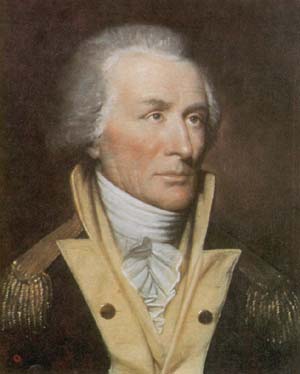Get Today in Masonic History into your Inbox. Sign up today for one of our email lists!
Need an article for your Trestleboard/Newsletter see our Use Policy
William Richardson Davie is Born

Today in Masonic History William Richardson Davie is born in 1756.
William Richardson Davie was an American solider and politician.
Davie was born on June 20th, 1756 in England. At the age of 7 his father took him to the American Colonies in the Waxhaw region near Lancaster, South Carolina. Davie was named after his uncle William Richardson. When Richardson passed away he inherited 150 acres of his uncle's land as well as a library. He attended the College of New Jersey, now Princeton University, graduating with honors in 1776.
After graduating from college, Davie went to North Carolina where he began to study law. By 1778, he had stopped his studies and had joined the local militia to fight during the American Revolution. This was a short tour of duty. Davie and the other members of his unit headed for Charleston to help defend the port city from the British. Before they arrived the threat had passed for the moment and the militia turned back to North Carolina. When the militia returned to North Carolina, Davie left the militia and resumed his legal studies.
The following year, in 1779, Davie once again left his legal studies and returned to military service. This time Davie raised a militia of his own, a cavalry unit which he helped to train. Davie was given a commission as a lieutenant for his work in raising the militia. Before long he was promoted to the rank of major and was given command of a cavalry unit which fought at the Battle of Stono Ferry. There Davie was seriously injured and fell from his horse. He was able to escape capture. While he convalesced from his injuries he continued his legal studies and in late 1779 "stood" for his exams and got his license to practice law in South Carolina.
In 1780, after he was fully recovered he raised another militia of cavalry. He headed his new unit to the Battle of Camden to join the battle under Horatio Gates. Davies and his men did not arrive in time for the battle and Gates was soundly defeated in the battle. Rather than retreat with the Continental Army under Gates, Davie headed further south. Davie and his men harassed as much as possible the British Army under Cornwallis. The most audacious example of Davie's efforts came at the Battle of Charlotte. Davie was ordered to cover the retreat of the Continental Army. With only 150 men against 2,000 redcoats and loyalists under Cornwallis, Davie was still able to hold them off during three charges before having to retreat. Cornwallis held Charlotte for only a short time, a few weeks, before heading back to South Carolina.
After the Battle of Charlotte, Gates had been replaced by General Nathanael Greene. Greene was impressed with Davie and greatly changed Davie's role in the American Revolution. In 1781, Greene convinced Davie to become the commissary-general of the Southern Department of the Continental Army. Davie was put in charge of provisioning the forces of the Continental Army and the militias of North Carolina. Often funding the provisions with his own money.
After the war Davie entered politics. He elected several times to the North Carolina House of Commons. In 1787 he served at the Constitutional Convention, leaving before he could sign the document. He argued for the passage of the Constitution in the North Carolina Constitutional Convention. Through all of this, Davie remained active in the militia and as a member of the United States Army. During the War of 1812, President James Madison offered Davie command of the American forces, Davie declined.
In 1798, Davie was elected the 10th Governor of North Carolina. During his term border disputes between North Carolina and South Carolina were resolved as well as border disputes between North Carolina and Tennessee. He resigned as Governor in 1799 when President John Adams enlisted him to be part of a peace commission to France.
Davie passed away on November 20th, 1820.
Davie was raised in Occasional Lodge No. 1791. He served as Grand Master of the Grand Lodge of North Carolina from 1792 to 1798. During the time Davie laid the cornerstone in a masonic ceremony for the University of North Carolina. The University of North Carolina was the first public university in the United States and Davie is considered the "Father of the University." A tree on the campus is called the "Davie Poplar", legend has it Davie tied his horse to the tree while scouting for the location of the University.
This article provided by Brother Eric C. Steele.

